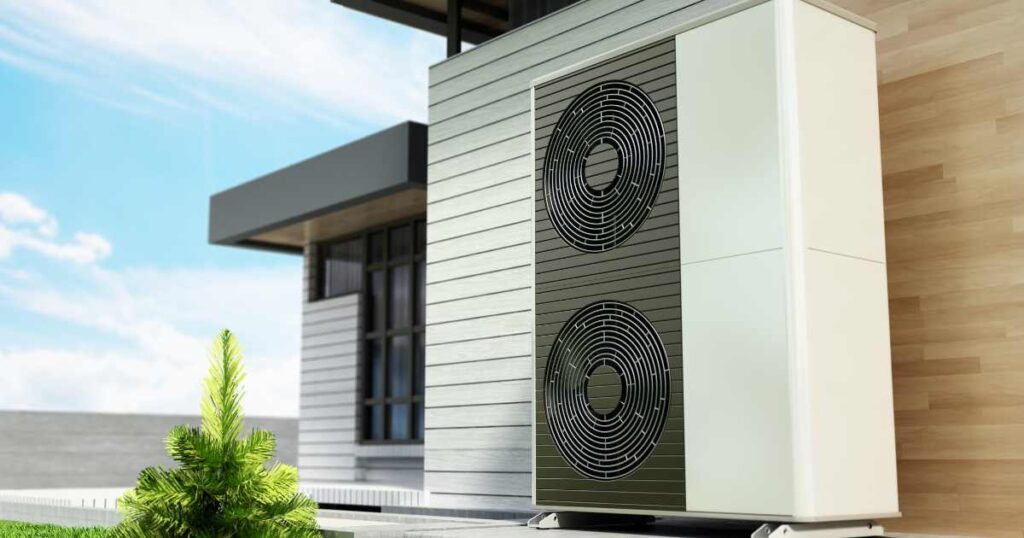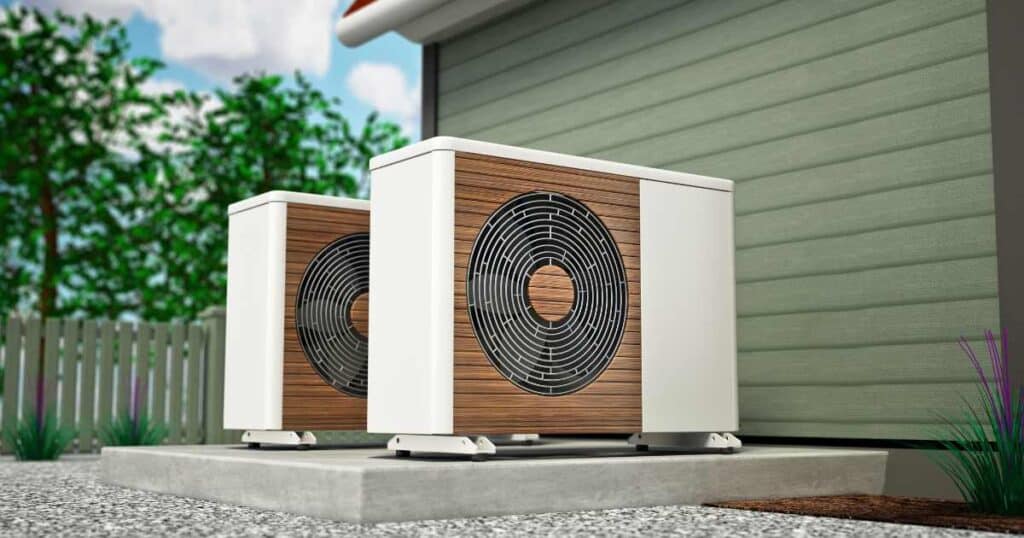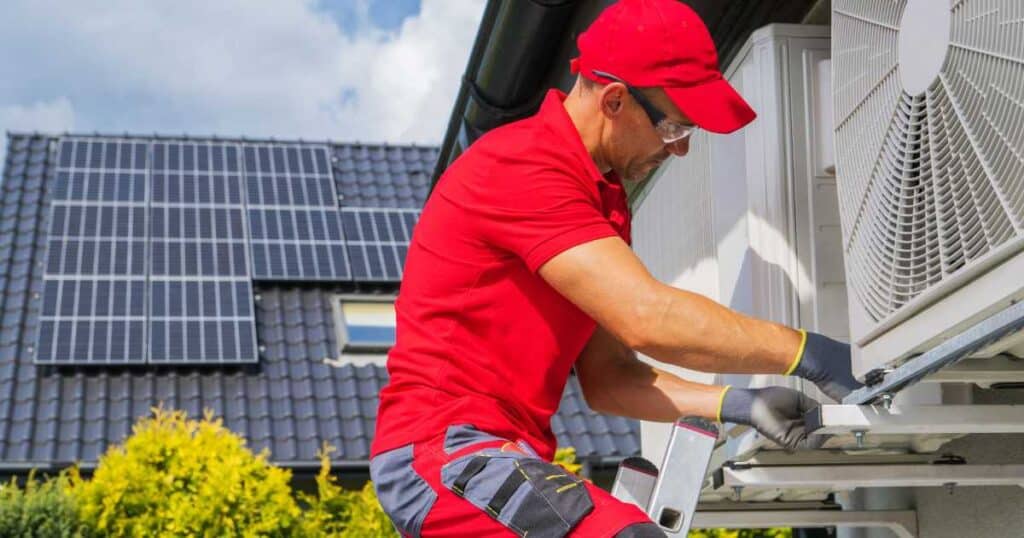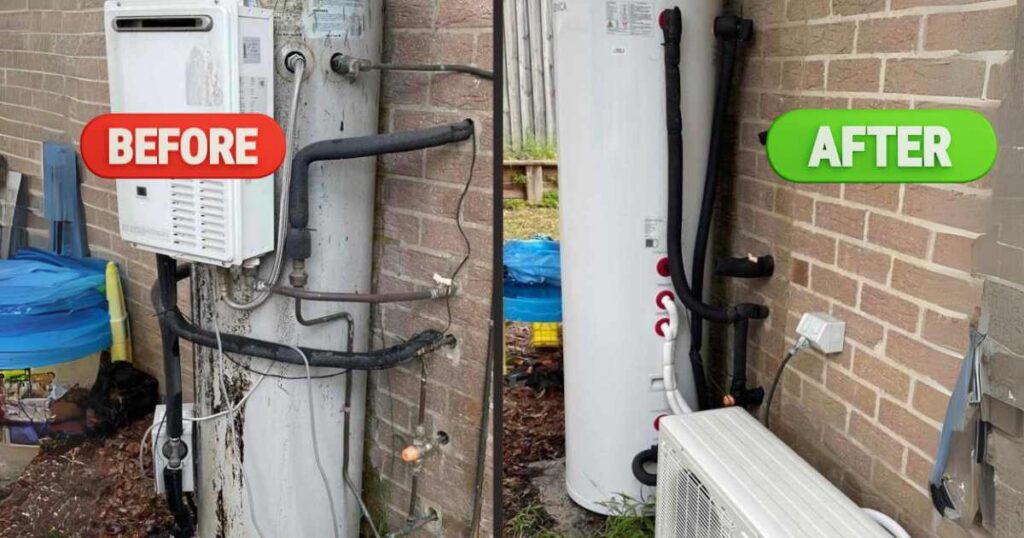The choice of a hot water system is a critical decision for homeowners in Victoria and New South Wales (NSW), impacting both comfort and energy bills. This guide covers everything from the types of systems available to the benefits, costs, rebates, and eligibility criteria. Additionally, we’ll highlight the role of Renewable Energy Upgrades, a company providing installation services with significant rebates in these regions.
Tips to Select the Perfect Hot Water System

Selecting the ideal hot water system for your household requires careful consideration of various factors to ensure efficiency, cost-effectiveness, and suitability to your lifestyle. Here are 10 tips to help guide your decision
Assess Your Household’s Size and Needs
- Capacity: The size of your hot water system should match your household’s daily usage. Larger families typically require systems with greater capacity to meet peak demand times.
- Usage Patterns: Consider when and how often your family uses hot water. High simultaneous usage might require a system with rapid recovery rates.
2. Evaluate Different Types of Systems
- Electric Systems: Often have lower upfront costs but can be more expensive to run. Suitable for indoor installation with a smaller footprint.
- Gas Systems: Ideal for homes with natural gas access. They offer lower operating costs and are efficient for larger households.
- Solar Hot Water Systems: Utilize solar panels, offering significant long-term savings and environmental benefits. Ideal in areas with ample sunlight.
- Heat Pump Systems: Extract heat from the air, highly efficient, and environmentally friendly. Best in moderate to warm climates.
3. Energy Efficiency
Energy efficiency in modern hot water systems is achieved through advanced technology and design:
- Improved Insulation: Enhanced insulation reduces heat loss, maintaining water temperature for longer periods and reducing the need for continuous heating.
- Smart Heating Technologies: Many modern systems include features like on-demand heating, which only heats water as needed, significantly reducing energy usage.
- Temperature Control: Precise temperature controls prevent energy wastage from overheating.
- Energy Star Ratings: Higher-rated systems are optimized for energy efficiency, consuming less power.
Overall, the energy efficiency of these systems not only lowers utility bills but also contributes to a more sustainable environment.
4. Consider the Available Space
When considering a new hot water system, the available space is a crucial factor:
- System Size: The physical size of the hot water system should fit within the designated area in your home, whether it’s an indoor utility room, a basement, or an outdoor space.
- Installation Requirements: Some systems, like solar hot water heaters, need additional space for components like solar panels.
- Accessibility for Maintenance: Ensure there’s enough space around the system for easy access, necessary for maintenance and repairs.
Carefully evaluating the available space helps ensure that the chosen hot water system is not only efficient but also fits seamlessly into your home environment.
5. Understand the Initial Cost vs. Long-term Savings
- Budgeting: Factor in both the purchase price and installation costs against potential energy savings over the lifespan of the system.
- Investment Return: Calculate the return on investment by considering how much you’ll save on energy bills and any increase in property value.
6. Check for Government Rebates and Incentives
Rebates and Eligibility are different for Victoria and NSW, we are covering the major facts that are important:-
Rebates and Eligibility for Victorian Residents
Rebate Value: Rebate is Different for Different Hot water systems but if we talked about an electric hot water system, you can get up to 3500$ rebate for this hot water system because Renewable Energy Upgrades minimize the cost for Victorian residents so that they can exchange their old electric hot water system with new one.
Eligibility Criteria: Here are a few main Eligibility for getting the rebate for electric hot water systems through renewable energy upgrades.
- Ownership: Applicants must be owner-occupiers of the property where the system is installed.
- Existing System Age: The hot water system being replaced must be more than 10 years old.
- Previous Rebates: The property address must not have previously received a hot water rebate under the Solar Homes Program.
- Installation Requirements: Solar hot water installations must be completed by a licensed plumber, and electrical work must be done by a Class A electrician licensed by Energy Safe Victoria or a recognized equivalent from another Australian jurisdiction
Rebates and Eligibility for NSW Residents & Businesses
In New South Wales, Renewable Energy Upgrades offers installation services for energy-efficient hot water systems, leveraging state government rebates to make these upgrades more affordable. Here’s a brief overview:
NSW Heat Pump Hot Water Rebate and Renewable Energy Upgrades
- Rebate Offer: NSW residents can access a government rebate for installing heat pump hot water systems, aimed at reducing energy costs.
- Eligibility: Available to those with existing electric or gas hot water systems.
- Renewable Energy Upgrades Services: The company provides installation services for these energy-efficient systems at reduced prices, thanks to the NSW State and Federal Government support. This makes it a cost-effective option for residents looking to switch to more sustainable hot water systems.
By utilizing these rebates, Renewable Energy Upgrades helps NSW residents and businesses install energy-efficient hot water systems, contributing to reduced energy costs and a smaller environmental footprint.
You can also fill out the form so that we can know better your requirements and get in touch with you.
7. Installation Requirements
- Professional Installation: Choose reputable companies like Renewable Energy Upgrades for professional installation, ensuring optimal functionality and compliance with warranty requirements.
- Local Regulations: Check local building codes and regulations regarding the installation of hot water systems.
8. Maintenance and Longevity
The maintenance and longevity of modern hot water systems are critical factors for homeowners:
- Durability: New systems are built with advanced materials and technology, making them more durable and less prone to breakdowns.
- Regular Maintenance: Although newer models require less maintenance, regular check-ups can extend their lifespan and ensure optimal performance.
- Preventative Measures: Simple maintenance tasks, like checking for leaks or insulating pipes, can prevent larger issues and extend the system’s life.
- Professional Servicing: Regular professional servicing, as recommended by the manufacturer, can identify and rectify minor issues before they escalate.
- Longer Lifespan: Generally, modern hot water systems have a longer operational lifespan than older models, offering better long-term value.
In summary, while new hot water systems minimize the need for frequent maintenance, adhering to regular check-ups and professional servicing can significantly extend their lifespan and ensure efficient operation.
9. Environmental Impact
The environmental impact of upgrading to a more efficient hot water system is significant and multifaceted:
- Reduced Energy Consumption: Efficient systems require less energy to heat water, leading to lower consumption of natural resources.
- Lower Greenhouse Gas Emissions: By consuming less energy, these systems emit fewer greenhouse gases, particularly if they replace gas or traditional electric systems.
- Sustainable Energy Sources: Systems like solar hot water heaters use renewable energy, further reducing environmental impact.
- Decreased Fossil Fuel Dependence: Efficient electric and solar systems can reduce reliance on fossil fuels, aiding in the transition to a more sustainable energy grid.
Overall, upgrading hot water systems plays a crucial role in reducing environmental footprints and promoting a more sustainable future.
10. Consult with Professionals
- Expert Advice: Professionals can offer tailored advice based on your specific needs, household size, and energy goals.
- Installation Expertise: Companies like Renewable Energy Upgrades have the expertise to guide you through the selection process, manage installation, and assist with rebate applications.
Benefits of Upgrading Your Hot Water System

1. Energy Efficiency
- Reduced Consumption: Modern hot water systems use advanced technologies to heat water more efficiently, resulting in lower energy consumption.
- Cost-Effective: By using less energy, these systems significantly reduce electricity or gas bills over time.
2. Environmental Impact
- Lower Carbon Footprint: Efficient systems produce fewer greenhouse gas emissions, contributing to a healthier environment.
- Sustainable Living: Upgrading aligns with sustainable living practices, especially if the system uses renewable energy sources like solar.
3. Consistent Hot Water Supply
- Reliability: New hot water systems provide a steady supply of hot water, eliminating issues like running out of hot water during peak times.
- Advanced Technology: Many new systems include features that ensure consistent water temperature and availability.
4. Cost Savings
Upgrading to a modern hot water system can lead to significant cost savings:
- Reduced Energy Bills: Energy-efficient systems use less power or gas, leading to lower monthly energy bills.
- Longevity: Newer models have longer lifespans, reducing the frequency of replacements.
- Maintenance: Advanced systems typically require less maintenance, saving on repair costs over time.
- Rebates and Incentives: Many regions offer rebates for energy-efficient systems, offsetting initial costs.
5. Increased Property Value
- Home Value Enhancement: Homes equipped with modern, efficient hot water systems are often more attractive to potential buyers.
- Appeal to Eco-conscious Buyers: Energy-efficient homes appeal to a growing segment of environmentally-conscious homebuyers.
6. Better Temperature Control
- Precise Control: New systems offer better control over the temperature, allowing users to set their preferred heating levels.
- Programmable Systems: Some systems can be programmed to heat water at specific times, increasing convenience and efficiency.
7. Reduced Maintenance Costs
Upgrading to a new hot water system often results in reduced maintenance costs, a significant advantage for homeowners:
- Improved Reliability: Newer systems are typically more reliable, decreasing the frequency of breakdowns and repairs.
- Advanced Technology: Modern systems often include durable components and advanced technologies that are less prone to wear and tear.
- Longer Lifespan: New hot water systems generally have a longer operational lifespan compared to older models, reducing the need for frequent replacements.
- Warranty Coverage: Most new systems come with extended warranties, providing peace of mind and protection against potential defects or issues.
- Efficient Operation: Efficient systems are less likely to suffer from problems like sediment build-up, which can reduce maintenance needs over time.
8. Eligibility for Rebates and Incentives
- Financial Incentives: Many regions, including NSW and Victoria, offer financial incentives to encourage the installation of energy-efficient systems.
- Ease of Upgrade: These incentives make it financially easier for homeowners to upgrade their systems.
Installation by Renewable Energy Upgrades

Renewable Energy Upgrades, with operations in Victoria and New South Wales (NSW), is a leader in installing high-energy-efficiency hot water systems. Their expertise extends beyond mere installation; they assist customers in navigating rebate programs, ensuring homeowners can take full advantage of available government incentives.
Their service package includes a comprehensive assessment of each household’s unique needs, recommending the most suitable hot water systems. By partnering with Renewable Energy Upgrades, customers benefit from a holistic approach that encompasses efficient installation, cost-effective solutions, and support in accessing rebates. This combination of expert installation services and financial savvy positions Renewable Energy Upgrades as a preferred choice for homeowners seeking to enhance their home’s energy efficiency and reduce long-term costs. Call us at 1300738787 for more details.
Renewable Energy Upgrades specializes in the installation of energy-efficient hot water systems, ensuring a seamless and professional process:
- Expertise: Their team of skilled technicians has extensive experience in various types of hot water system installations.
- Customer-Centric Approach: They prioritize customer needs, offering tailored solutions for each household.
- Customer Testimonial: “After Renewable Energy Upgrades installed our new solar hot water system, we noticed a significant decrease in our energy bills. The installation was quick and professional.” – Jane D., Melbourne
In a recent project in epping victoria, Renewable Energy Upgrades installed a heat pump system for a family, resulting in a 40% reduction in their energy consumption, showcasing the company's commitment to providing cost-effective and environmentally friendly solutions.
FAQ for Hot Water System
The most efficient hot water system typically depends on various factors, including local climate, energy prices, and personal usage patterns. However, electric hot water systems are often considered the most efficient as they use renewable energy, followed by heat pump systems which are also energy-efficient.
The three main types of hot water systems are:
Storage water heaters, which heat and store water in an insulated tank for use when needed.
Continuous flow (or tankless) water heaters, heat water directly as it flows through the unit without storing it.
Heat pump water heaters, use electricity to move heat from one place to another instead of generating heat directly.
Popular brands for hot water systems vary by region but might include Rheem, Rinnai, Bosch, A.O. Smith, and Bradford White, among others. It’s important to consider both the brand’s reputation and the specific model’s performance when choosing.
In Australia, the cheapest hot water systems to run are usually those that use off-peak electricity, solar with gas or electric boosting, or heat pumps, due to their high efficiency and lower operating costs.
The cheapest option upfront is usually a standard electric storage water heater, but for long-term savings, solar or heat pump or electric systems might be cheaper due to lower running costs.
The cheapest way to heat water for your home is typically using natural gas if available, or using a heat pump or solar water heating system which has higher efficiency and lower running costs compared to traditional gas water heaters.
Conclusion
In conclusion, upgrading to an efficient hot water system is a wise decision for homeowners in terms of energy efficiency, cost savings, and environmental impact. Companies like Renewable Energy Upgrades play a pivotal role in this transition. Their expertise in installing electric hot water systems, combined with their ability to facilitate significant rebates, makes them a valuable partner in enhancing home energy efficiency. By choosing a suitable system and leveraging expert installation services, homeowners can enjoy the dual benefits of reduced energy bills and a lower carbon footprint, contributing to a more sustainable future.


